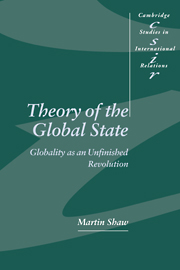Book contents
- Frontmatter
- Contents
- Preface
- 1 Introduction: globality in historical perspective
- Part I Critique
- Part II History and agency
- 4 Internationalized bloc-states and democratic revolution
- 5 Global revolution, counterrevolution and genocidal war
- Part III State
- Part IV Conclusion
- References
- Index
- CAMBRIDGE STUDIES IN INTERNATIONAL RELATIONS
4 - Internationalized bloc-states and democratic revolution
Published online by Cambridge University Press: 07 October 2009
- Frontmatter
- Contents
- Preface
- 1 Introduction: globality in historical perspective
- Part I Critique
- Part II History and agency
- 4 Internationalized bloc-states and democratic revolution
- 5 Global revolution, counterrevolution and genocidal war
- Part III State
- Part IV Conclusion
- References
- Index
- CAMBRIDGE STUDIES IN INTERNATIONAL RELATIONS
Summary
In this part of the book I lay out, over two chapters, a schematic historical account of the global revolution. I offer a kind of theoretical history – or historical social theory. I am aware that this undertaking is likely to fall between the stools of theory and history, insufficiently abstract for the former, insufficiently grounded for the latter. I argued in chapter 2 that current theoretical difficulties cannot be resolved at the metatheoretical level. Nor, however, can they be resolved solely at the level of what Mann has called the ‘empirical theory’ of historical sociology. The large-scale historical narrative has been discredited in recent times, not least because of the failures of Marxism. However, we should not throw out the baby with the bathwater. Conscious of the dangers of determinism and teleology, aware that any such narrative must also be provisional, we still need to get a grip on a historical overview. Otherwise our theoretical assumptions will tend towards ‘grand theory’ and our empirical study towards ‘empiricism’, each of them, as Mills pointed out, equally ahistorical.
Here I develop the critique of national and international thought which I presented in chapter 2, as a means to define the principal contours of historical change in the modern era. I relate this account to the issues raised by the critique of recent global thought in the last chapter.
- Type
- Chapter
- Information
- Theory of the Global StateGlobality as an Unfinished Revolution, pp. 101 - 143Publisher: Cambridge University PressPrint publication year: 2000

